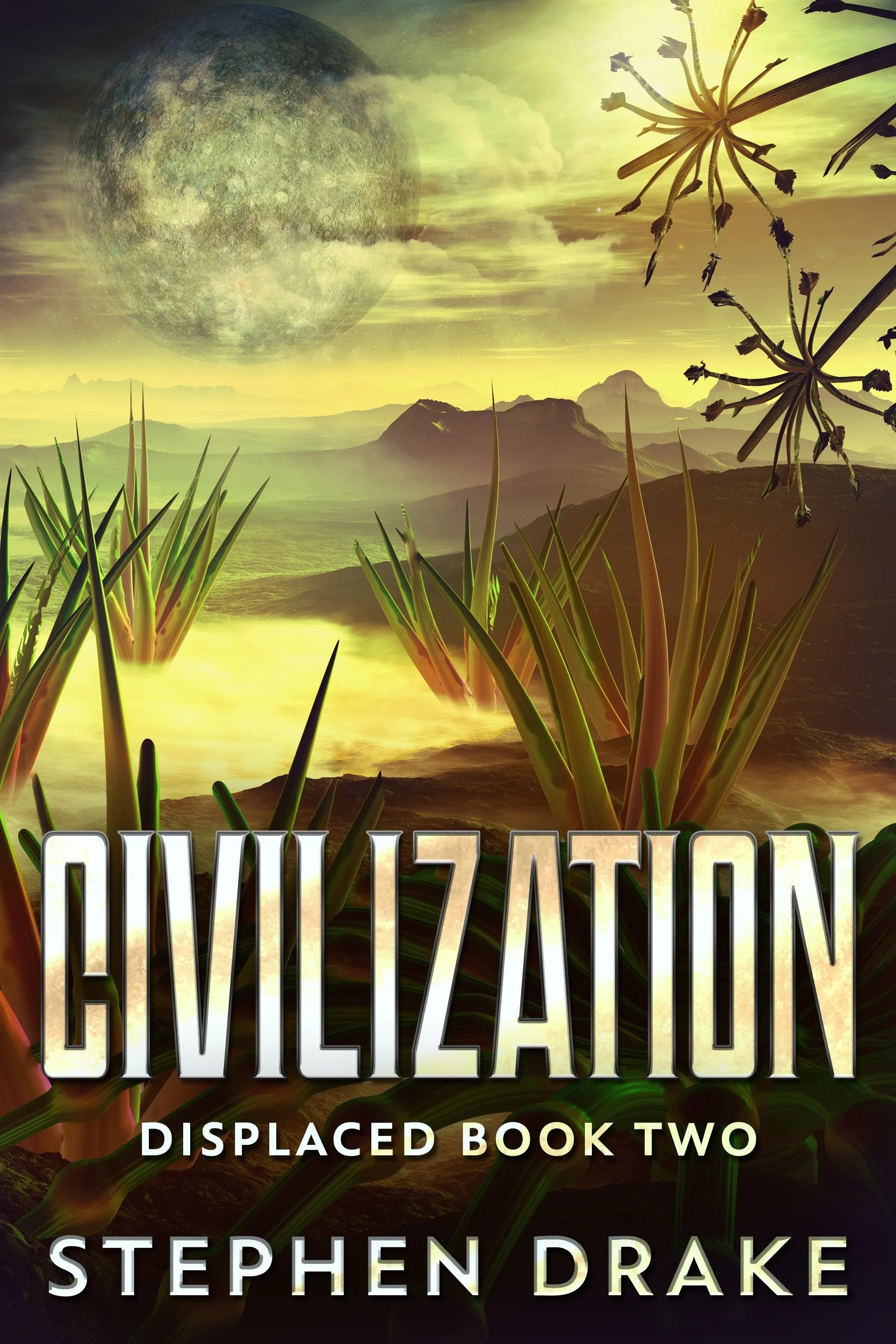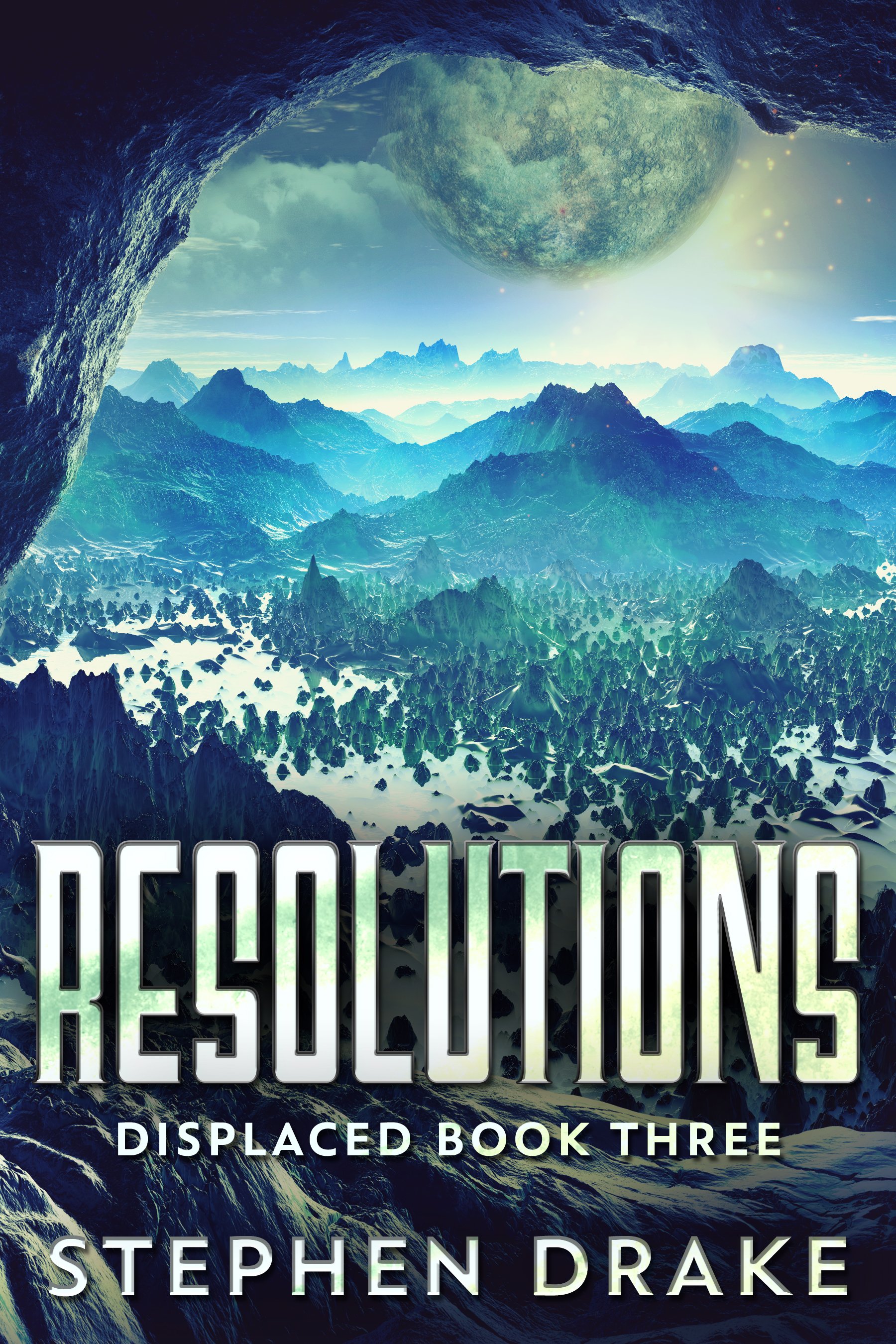Displaced (Displaced Book 1)
Book summary
A group of ten individuals, led by the cautious Kevin Murdock, awakens in a strange new environment where everything is oversized—including the danger. As tensions rise between Murdock and the power-hungry James Whittier, they discover an even greater threat lurking among them, putting their survival at risk.
Excerpt from Displaced
Chapter One
Murdock’s awareness was such that he knew he was sleeping. “Murdock. Wake up,” he heard a soft, clear, contralto voice beckoning him. Or was he dreaming it? He couldn’t place the voice and it sounded distant, irresistible.
“Kevin Murdock! Wake up!”
As Murdock began to wake, he found his brain to be fuzzy and his thoughts seemed slow. Where was he? He tried, but failed, to open his eyes; the lids were stuck together. Then he tried to raise his hand to rub them and found his arm unexpectedly heavy and weak.
The voice seemed to be everywhere. He felt cocooned in it. He heard no other noises. No humming, clicking, or buzzing. He felt encased in a thick blanket that blocked all extraneous sounds. Only the voice remained. After a few seconds, he tried to get to his feet, despite being blind and lost in his surroundings.
It took several attempts before Murdock struggled to his feet and kept his balance. He touched his chest and felt something smooth and clingy against his skin. Sliding his hand down to his thigh, he found that it covered him from neck to at least his legs.
“Whe—” His voiced cracked. His throat was dry and scratchy. With great difficulty, he managed a small swallow. “Where am I? What’s going on?” he croaked, more to himself than to anyone in particular. To him, his voice sounded thin and weak.
“To your left is a basin to wash your face,” the room-filling voice instructed.
He stumbled to the basin, and water began running. Murdock dipped the water out in his hands and started to clean his face and eyes. He found he now had quite a long beard. He ran his wet hands through his hair, which was quite long, longer than he normally kept it. He held on to the sides of the basin, his head lowered and eyes closed, attempting to organize his thoughts. He did manage to lubricate his throat with a few handfuls of water.
“A towel is located to your right.”
He reached out his right hand, locating the towel, and started to dry off his face. His vision was slowly clearing.
“Who are you?” Murdock asked. To him, the voice now seemed too perfect, too mechanical.
“My official designation is Transport pod TP737-1, but I will respond to ‘Ship’ or ‘Pod’.”
“You’re a computer?”
“No, I am the transport pod,” the voice corrected.
“That’s a distinction without a difference.” I’m not in the mood to argue with a damn computer, he thought. His belly was empty, and he needed coffee, badly. “Any chance for breakfast and coffee?” he asked.
“When you are ready, a meal will be waiting in the main compartment,” the ship responded.
Murdock’s vision was clearing and he could make out a small, unremarkable compartment with what looked to be a flat surgical table, with glass panels hanging below the pad. As he stepped away from the basin, it disappeared into the wall, as did the towel rack, once he replaced the used towel. He looked down and saw he was dressed in a clear jumpsuit, but he had no idea what the material was made of.
“Your clothing is located under the sleeping pad. Press your thumb to the switch-plate located on the sleeping pad frame to open the storage bin.”
Murdock complied, and a drawer opened just beneath the pad. In it, he found his buckskins sealed in plastic. He tried to figure out how the jumpsuit unfastened, but couldn’t, so he ripped it off and began to get dressed.
Once clothed, he looked around and noticed a doorway. As he started toward it, he heard a slight sigh behind him. When he turned around, he found the surgical table gone, and he stood in an empty compartment.
Through the doorway, he could see a small table and moved slowly toward it. His meal had appeared in the small wall-niche that was the food dispenser, while he slowly walked to the table. He sat in the very functional but uncomfortable chair.
He placed a bowl of thin oatmeal and a cup of weak tea on the table. The oatmeal looked neither substantial nor appetizing, but Murdock began eating. While he ate, a screen came to life showing views of the outside while an unseen male spoke…
“You are aboard a transport pod that has landed on the surface of a planet, and it will never leave. During your journey, between one hundred fifty and three hundred fifty years have elapsed on our planet, though only two to three years have elapsed for you physically. This transport pod may, or may not, be the first, but it is not the only one. Every five years, another pod will land within a twenty-mile radius of this one. Each successive pod will increase your population by a factor of ten.
“This pod’s batteries will last three hundred sixty-five, twenty-four hour days — one year, as each of you is used to, if steps are taken to preserve the energy stored in them and the solar panels are kept clear of debris.
“You were not sent here to die, but to survive, if you can. You will find, in compartments accessible from the outside, weapons, tools, and a limited supply of food.
“Trying to return to Earth is a waste of time and effort. Your old planet no longer exists. It is now our planet. Your planet, now, is the one you are on, if you can tame it. You were sent away because none of you are compatible with our requirements, but some of your progeny might be. Good luck.”
The screen went blank.
Murdock had just finished his meager meal, which turned out to be more filling than it looked, when he heard the door open. A young woman came through the door looking haggard and disoriented. He estimated her age to be about the same as his, maybe a little younger. She was nicely built, with light brown hair and wore blue jeans and a flannel shirt.
“What are you looking at and who the hell are you supposed to be?” she asked with disdain, in a deep, sultry voice.
“What do you…” Murdock started and stopped to clear his throat. “What do you mean?” he asked quietly.
“I haven’t seen anyone dressed like that, except in old movies. You look like some producer’s idea of Daniel Boone.”
Murdock stiffened and tried to ignore her comment. He was used to this reaction from others when he wore his buckskins.
He got up from the chair. The woman sat and began eating her meal. The screen once again came to life, repeating the message Murdock had just heard. He meandered around, studying the compartment, but could find no door or window to the outside. He longed to get out and into the fresh air.
The screen stopped and the woman got up, looking dazed and confused. Then the door opened again; this time, a large man in his forties came out, dressed in a business suit. The man ignored everyone and sat and ate. Again the message played. By this time, the idea of a generic message, to be used by all the pods, finally occurred to Murdock.
After three hours of this routine, twenty people, ten males, ten females, were crammed into the small compartment. Murdock felt quite claustrophobic. Just then, a motor started and a ramp opened. The smell of fresh, clean, outside air hit him, full force, and Murdock gladly breathed it in.
At the time the ramp opened, Murdock had been as far from the exit as was possible. As everyone moved en masse toward the ramp, his feeling of claustrophobia increased — until his feet met virgin ground. Once free of the others, he started to walk around the base of the transport.
From the outside, the pod looked a lot larger than it had on the inside. The flattened oval shape did not surprise him — the interior rooms had already hinted at the general shape of the craft.
As he walked around, Murdock took stock of the surroundings. The transport had landed in the middle of a grassy meadow fifty yards wide and one hundred yards long, by his approximation. The land appeared lush and fertile and, as far as he could make out, not swampy.
At least it isn’t a high desert environment, he thought. He could hear water running, not too far away, and an abundance of trees surrounded the meadow. The area reminded him of Western Montana, Northern Idaho, or the Cascade mountains in Washington State. The trees consisted of conifers, oak, maple, aspen, and birch. He noticed that everything was a different shade than he was used to — a bluish tint to vegetation that should be green — and no curious little creatures checked out the new arrivals.
Additionally, he heard no insects. All he could hear was a soft breeze in the trees and the running water, for he had tuned out the sounds his companions were making as they looked around and talked among themselves.
On his second trip around the transport pod, he found the storage compartments and opened them. If you want something done, do it yourself, he thought. Don’t wait for others. He began by pulling out the items, leaving them on the ground where they fell. No one else moved to help him.
As he made his way around the pod, he heard parts of conversations.
“I don’t believe a word of it!” one of the women was saying.
“I don’t know, things don’t look like I remember,” one of the males responded.
“Do you have any idea how expensive it is, transporting the numbers of people we were told are either here or will be here? I think it’s all a hoax!” another male stated.
“I think we are being watched!” another woman said in a loud whisper.
Murdock chuckled to himself. To him, it didn’t matter if it was a hoax or not. Complaining or spouting paranoid conspiracy rhetoric was a waste of time and energy. All that mattered was the here and now… and survival.
As James Whittier was being revived, he was dreaming. His father was lecturing him again.
“Most people are lazy, wanting someone to take responsibility for their needs, and will think they are giving power to those who provide them,” his father said in his dream.
He always seemed to go on incessantly. Usually, James wanted to strangle him just to shut him up. His father had been a successful political figure and had constantly lectured him about the things he had learned in what he referred to as “the hard way.”
“As long as the little people think that you have the answers, they’ll do what you tell them,” his father continued inside his head. “But as soon as they lose faith in you, head for the hills. People won’t give you anything! You have to take it from them! And you have to do so in such a manner that they think it’s their idea and to their benefit. Politicians have to be magicians, using subtle means and misdirection to get their agendas supported by the governed.”
The elder Whittier had died while James was in his second year of college. He was glad of it as that meant he was paroled from his father’s incessant lecturing. At times of stress, though, all he could hear inside his head was the endless pontificating of his father.
“People want the government to provide everything for them and to have the power to act on their behalf,” his father’s voice continued. “To have that power, you have to be part of that government. They must never know that governments get in the way, most of the time, and are never for the benefit of the governed.”
James’ father had been a true disciple in the religion of government and had wanted his son to be its acolyte.
And James had done his best to continue his father’s legacy. The first time James had been caught cheating he was six and was punished — not for cheating, but for getting caught.
“What most people call ‘truth’ is not as objective as they may think; in fact, it is very subjective,” the voice inside his head continued. “To a politician, ‘truth’ is whatever the politician says it is. Therefore, no politician lies. No such thing as a lie; facts are fluid things that can be interpreted any way that suits the needs of the moment.”
James had managed to get into a good prep school on his father’s name and even managed to letter in a couple of sports without ever playing. Some of his fellow students said that he bribed, bought, and blackmailed his way through school. They were correct, of course, but James chalked it up to jealousy that they hadn’t thought of it first. His father had said he had accomplished a few “small feats” without dishonoring their good name.
When he had first learned the name of the school he would attend, James hired a few investigators without his father’s knowledge. Their job was to find some indiscretions of the Headmaster, one Potiphar Grimsdale. Once found, his man had gone to Grimsdale with the proper inducements so that by the time James entered his office for his initial interview, he was admitted.
By the time the year was out, Grimsdale was paying him through a second party for not disclosing those indiscretions. After four years, James’ bank account was greatly enhanced, and he had several sports letters, a high grade-point-average, and many letters of recommendation to his father’s alma mater.
In college, James managed to get his degree without working too hard. The right amount of money here, a bit of pressure there, and before he knew it, he was graduated. A few weeks later, he ran for mayor of Athens, Ohio.
“A powerful book with a powerful message”
“As a fan of sci-fi, this kept me from sleeping... Thoroughly enjoyed this book”
“The most original science fiction I have ever read”




















Praesent id libero id metus varius consectetur ac eget diam. Nulla felis nunc, consequat laoreet lacus id.